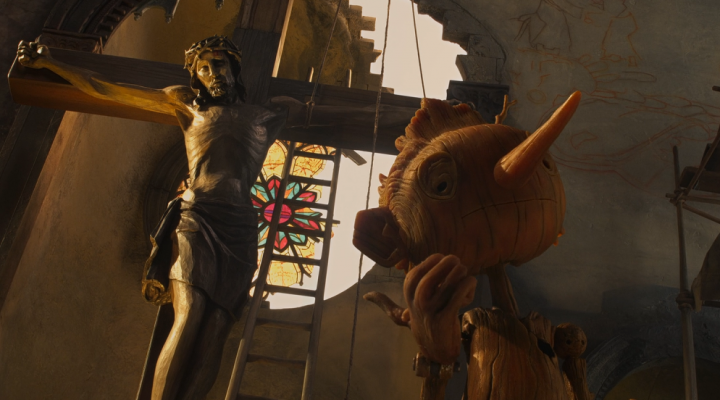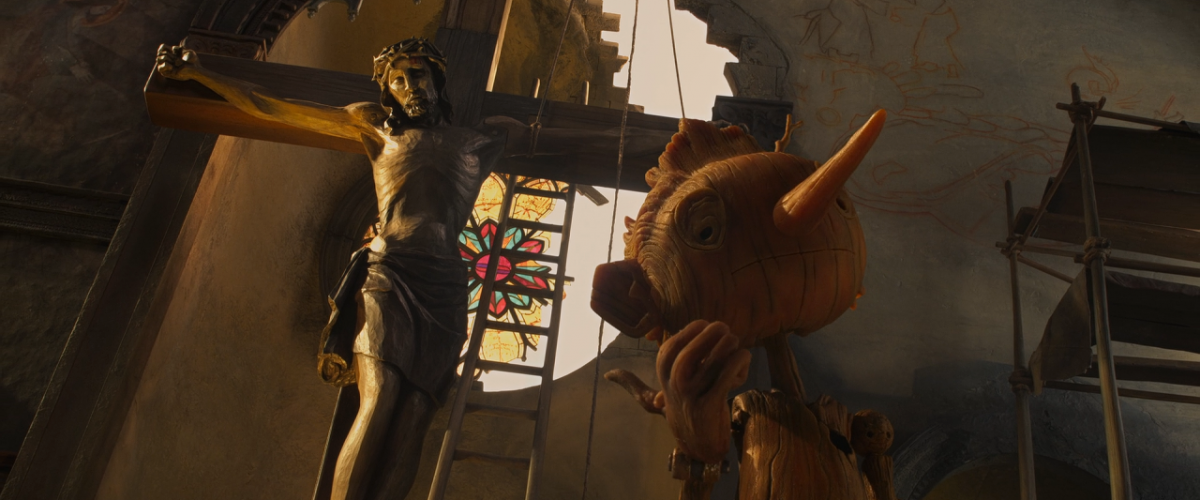Little did Pinocchio know as he stood amidst the congregation, playfully mimicking the crucifix with outstretched arms and joined feet, that he would soon be hung on a cross as well.
In Guillermo del Toro’s Pinocchio, now streaming on Netflix, del Toro has much to say about life, death, resurrection, human identity and the relationship between fathers and sons.
As the director of Pan’s Labyrinth and The Shape of Water, the Academy Award winning filmmaker is well known for his exploration of how our theology is reflected in our relationships. His latest film has been nominated for Best Animated Feature at the upcoming Academy Awards.
Re-engaging religion through art and storytelling
Del Toro always has had an aversion to violence. He recalls his grandma telling him of the Christian martyrs: “She’d say, ‘Then the little boy saw how the missionaries were tortured and boiled.’ And I was like, ‘Thank you, grandma.’”

Guillermo del Toro
Growing up Catholic in Guadalajara, Mexico, del Toro deconstructed his faith as a result of seeing the violence humans exert on one another. But eventually, he came to a place where he could engage with the images of Christianity in a way that would bring healing from the violence humans and institutions cause.
He told Charlie Rose in an interview from 2009 that “I mercifully lapsed as a Catholic,” while quoting the Spanish filmmaker Luis Buñuel Portolés saying, “I’m an atheist, thank God.” Yet, despite his atheism, he revealed to Rose that he is “once a Catholic, always a Catholic, in a way. … I believe in Man. I believe in mankind, as the worst and the best that has happened to this world.”
In a 2011 interview with Time, del Toro explained how he explores the religious tensions in his life through art. “To me, art and storytelling serve primal, spiritual functions in my daily life. Whether I’m telling a bedtime story to my kids or trying to mount a movie or write a short story or a novel, I take it very seriously.”
Referring to the stories of the martyrs his grandma told him, he said, “All that is in Pinocchio.”
Theology as dialogue about the darkness from a child’s point of view
Recalling when his mother took him to see Disney’s Pinocchio as a child, del Toro told CBC News: “I thought this is how scary it is to be a kid. This is somebody that understands how you can view the darkness from a child’s point of view.”
“The only thing that can save us is a dialogue with the darker parts of ourself.”
In a moment reminiscent of Christianity Today’s recent conversation about our collective anger, del Toro said: “Humanity’s sort of in the middle of a massive cosmic tantrum.” But rather than doubling down on retributive justice as evangelicals do, del Toro suggested: “The only thing that can save us is a dialogue with the darker parts of ourself. Imagination is empathy because it allows you to empty yourself into something that is not that easily accessible.”
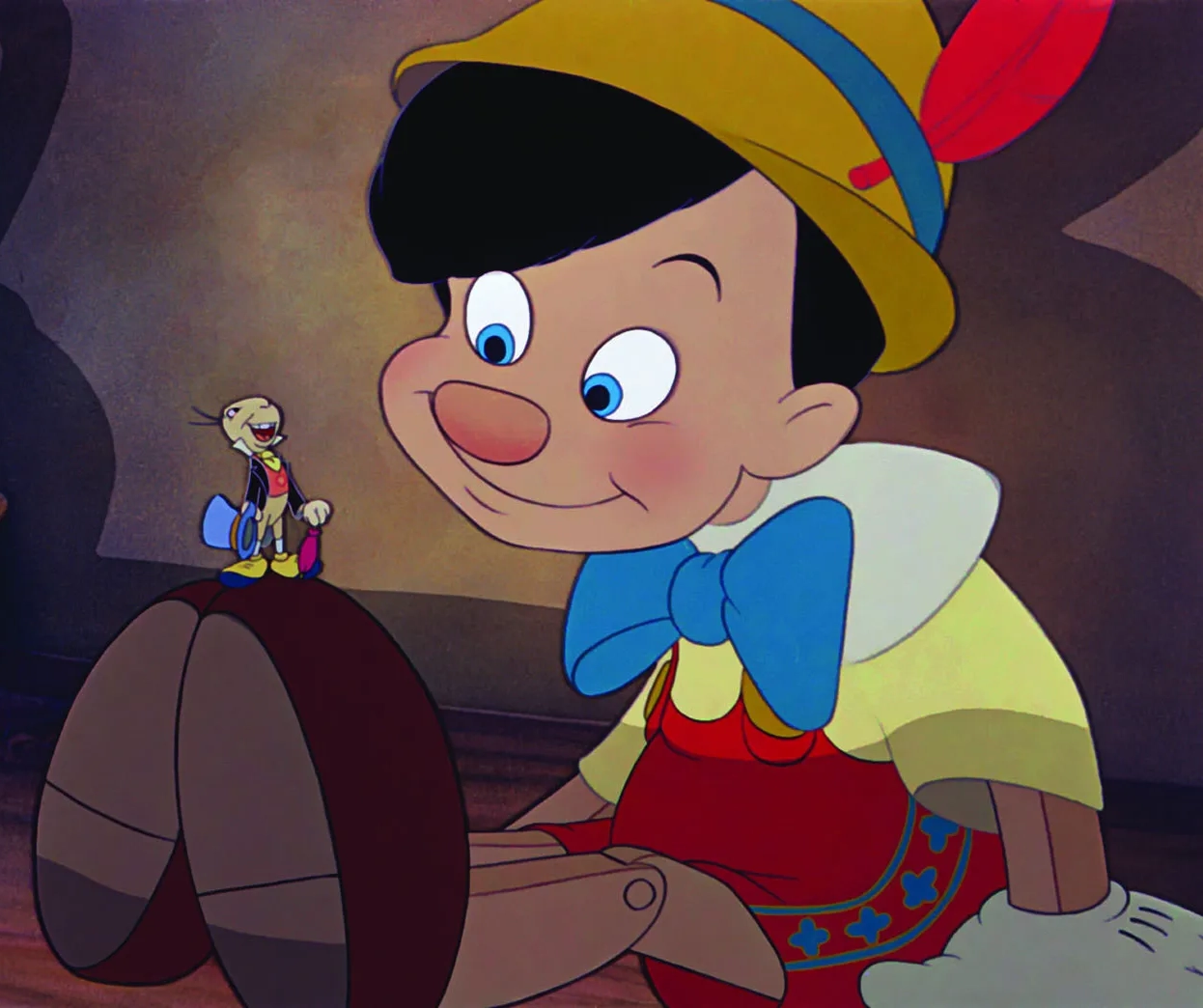 He believes his take on the classic children’s fairy tale will give space for this dialogue.
He believes his take on the classic children’s fairy tale will give space for this dialogue.
“The most thrilling thing for a kid and a parent is dialogue,” he said. Regarding whether his Pinocchio is a children’s movie, del Toro replied: “It’s not made for them. But they can watch it if their parents talk to them. You’re going to have a conversation about life, death, about parenthood. It actually allows the kid to ask questions.”
One cannot help but recognize the parallels between del Toro’s exploration of theology as a dialogue about the darkness from a child’s point of view and the way Jews and Christians have engaged theology for 3,000 years. The name “Israel” means “wrestles with God.” Christians are said to have faith “like a child.”
While the Bible records the dialogue ancient Jews and Christians had in their wrestling with God and one another, the contending has continued throughout the centuries as theologies evolved over time. No matter how confidently we assert our beliefs, we are all dialoguing as children. The way we talk about the infinite unveils the inner child-like dialogue we are having with the darker parts of ourselves.
Hierarchical cracking from institutional control
Comparing fairy tales and horror, del Toro told Time there are essentially two types of fairy tales. “One is pro-institution, which is the most reprehensible type of fairy tale: Don’t wander into the woods, and always obey your parents. The other type of fairy tale is completely anarchic and anti-establishment.”
In another interview, he said: “I hate structure. I’m completely anti-structural in terms of believing in institutions. I hate them. I hate any institutionalized social, religious or economic thing.”
The reason del Toro hates institutions is due to the control they tend to lord over the vulnerable within their walls. In Pinocchio, this hierarchical power is demonstrated through clergy with power over the congregation, parents with power over children, employers with power over employees, and military commanders with power over soldiers. Del Toro speaks of “the dynamics of the sort of ghostly, corrosive parental power that fascism exerts over certain souls” and calls fascism “another paternal story.”
“All these forces crack you when you’re a kid and then you spend the rest of your life figuring out how to manage.”
Institutional control is about those in power expecting perfection from those beneath them on the hierarchy as defined by those at the top. In del Toro’s childhood, he said: “I was always getting that from the church, from the Sunday service, and my grandma. And everybody was pressuring you to shape you. And I think my idea is that all these forces crack you when you’re a kid and then you spend the rest of your life figuring out how to manage.”
In the dialogue about deconstruction going on in American evangelicalism today, much of the catalyst for leaving institutions has been the cracking we feel from the weight of institutional and pastoral control.
Expecting perfection, but breaking the rules
Despite his fond memories of identifying with Pinocchio as a child, del Toro rejects Disney’s original take that emphasized the need for obedience. “I had a sense of otherness, like I didn’t conform to the idea that people had of young boys — healthy, playing football,” he said. “I didn’t like the idea of obedience and being something you’re not in order to be accepted.”
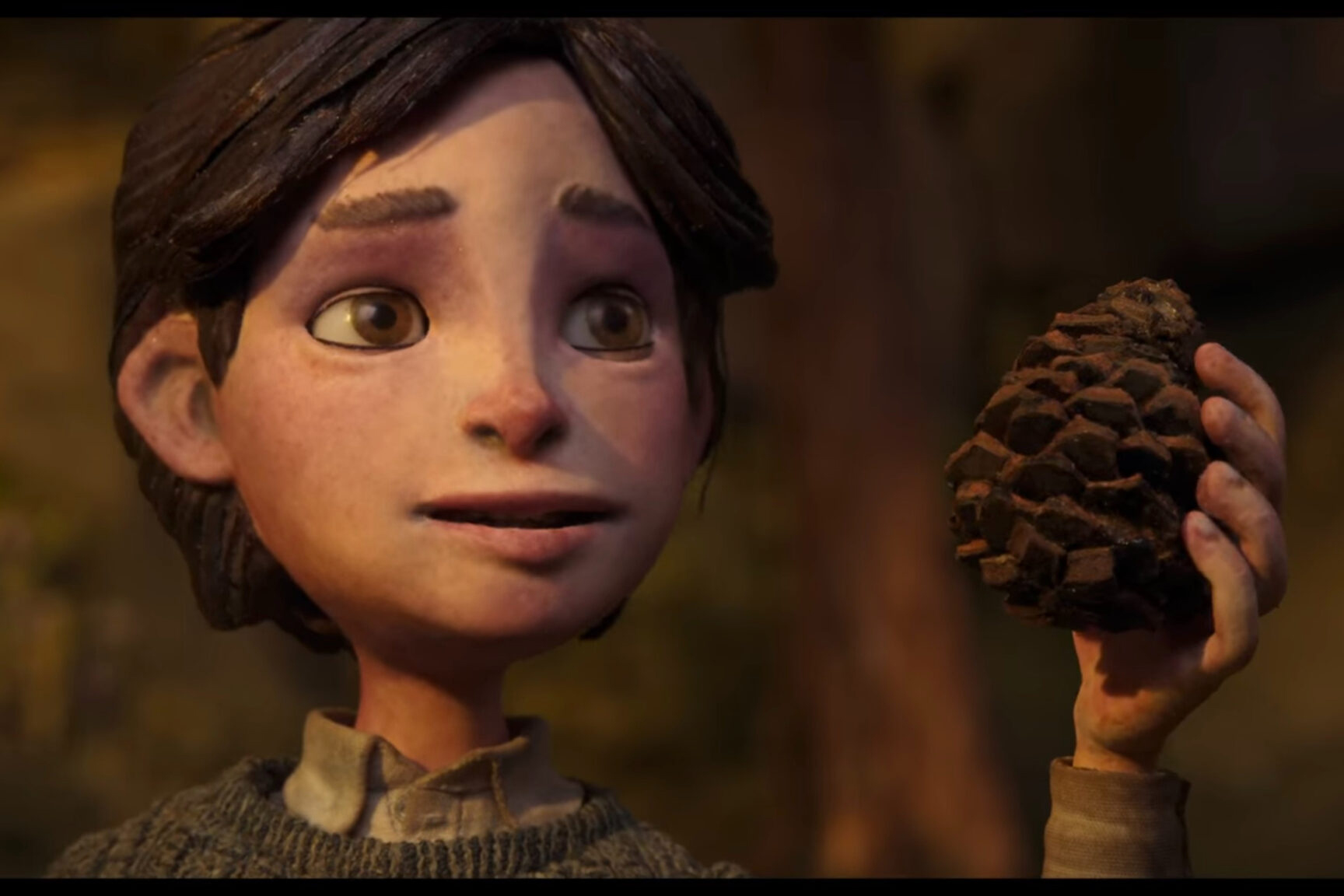
In del Toro’s hands, Pinocchio opens with the image of a pine cone and soon shows Carlo offering one to his father Geppetto. But Geppetto rejects the gift, saying, “No my son. It has to be perfect, complete.” Later, as they walk to church, a group of ladies in the town say Geppetto is “such a perfectionist.”
As Geppetto carves and paints the crucifix, Carlo puts another pine cone into a bucket along with the paint for the blood of Jesus and lifts them up to the cross to show Geppetto. When Geppetto congratulates Carlo for discovering the perfect pine cone, Carlo responds, “I thought I could plant it myself and watch the tree grow.”
After Gepetto and Carlo exit the church doors, Carlo runs back into the church to retrieve his perfect pine cone, as a war plane drops a bomb onto the church, killing Carlo. As Geppetto looks on in horror, the perfect pine cone gets blown out of the church and falls at his feet.
“The scene hints that growth doesn’t come from perfection but happens amidst the imperfections we move through.”
The scene hints that growth doesn’t come from perfection but happens amidst the imperfections we move through. So when Pinocchio comes along, he embodies the opposite of perfection according to everyone’s standard. Del Toro explained: “He is breaking everything. He is asking all the questions. He will not obey. He crushes the cricket. He bursts into church.”
As a result, Pinocchio and Geppetto “are really far apart from coming together.”
Jesus breaking the rules, overturning expectations
One of the most obvious parallels throughout the movie is the connection between Pinocchio and Jesus. “I wanted to have a parallel with Pinocchio being carved of wood,” del Toro said.
Pinocchio notices his connection to Jesus, mimicking the crucifix and then later asking Geppetto while pointing to the wooden Jesus, “Everybody likes him. … They were all singing to him. He’s made of wood too. Why do they like him and not me?”
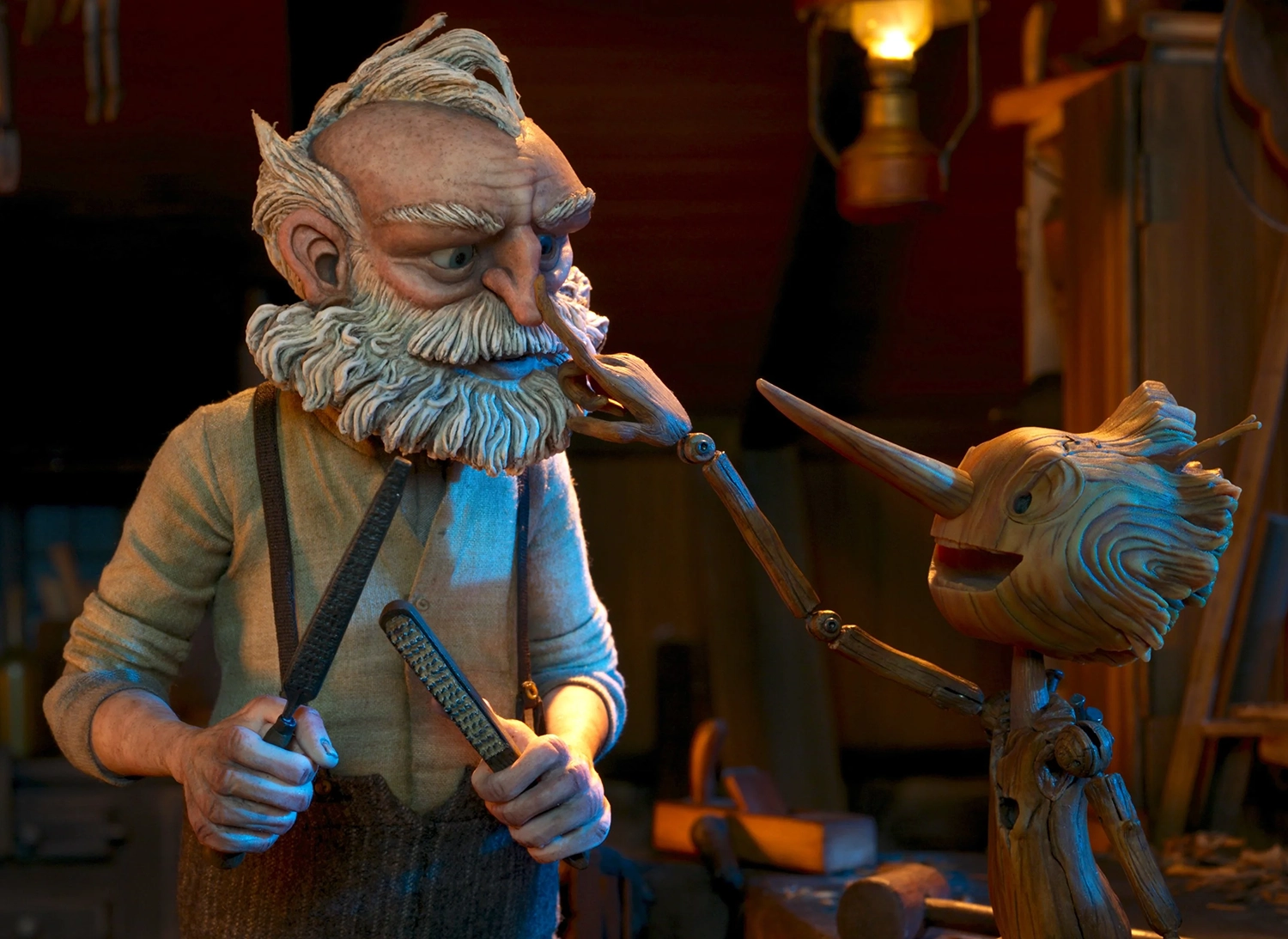 Just as Geppetto fantasized the memory of Carlo and, as del Toro puts it, “made him a perfect son,” many Christians today tend to present an idealized view of Jesus. Conservative evangelicals focus on his “perfect obedience” they believe earned righteousness that can be imputed to our righteousness spreadsheet by faith in his substitutionary work. Yet, they tend to smooth over the rough edges of Jesus, especially in the way he broke the rules and overturned expectations by subverting the institutional power structures of his day.
Just as Geppetto fantasized the memory of Carlo and, as del Toro puts it, “made him a perfect son,” many Christians today tend to present an idealized view of Jesus. Conservative evangelicals focus on his “perfect obedience” they believe earned righteousness that can be imputed to our righteousness spreadsheet by faith in his substitutionary work. Yet, they tend to smooth over the rough edges of Jesus, especially in the way he broke the rules and overturned expectations by subverting the institutional power structures of his day.
Jesus broke their Sabbath and doubled down, claiming humans were not created for the Sabbath, but the Sabbath for humans. He also claimed to have authority over the law by repeating, “You heard it said, but I say … .” And in a culture where being high and lifted up meant sitting on a throne and ruling over others, Jesus was high and lifted up on a cross. To the institutions of his day, Jesus was anything but perfect. He was considered a threat, someone who couldn’t be puppeteered.
We see the cross parallel in multiple places as Pinocchio hangs from a cross at one point condemned to death, and as he floats on a cross in the middle of the sea.
In a parallel to the temptation of Jesus, Count Volpe shows Pinocchio the city below him and offers, “You shall see all of the nations of the earth for yourself as they bow at your feet.” But like Jesus, Pinocchio breaks the rules in a way that brings people together rather than grabbing power over them as the political, religious, economic and family institutions would expect of him.
Del Toro explained: “If I’m going to make a movie about disobedience being a virtue, what better place to set it than in an invisible sort of string world where everybody obeys except the puppet?”
Real imperfect sons and real imperfect fathers
“Really the whole movie, including Jesus and God, is about fathers and sons,” del Toro explained. “And Pinocchio is sort of a surrogate, imperfect Messiah resurrecting and dying for those that he loves. I think all these wires are crossed in my head and they all make sense in the way they inform each other.”
Volpe is a circus master who becomes a father figure to a monkey named Spazzatura. He is a transactional father figure who values power and sees relationships as based on a retributive justice of accounting.
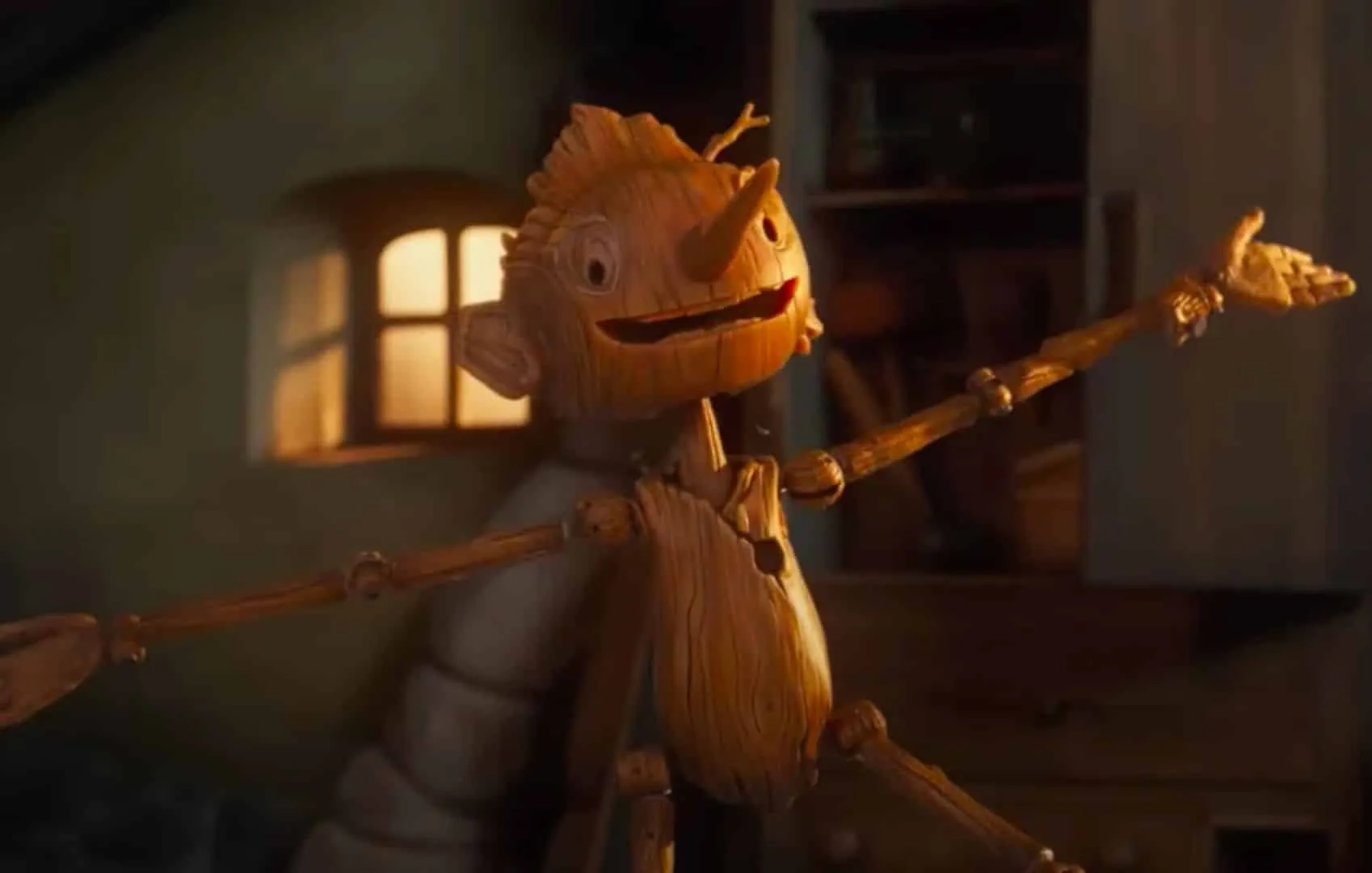 “I found you at the bottom of that cage in the rain. You were left there to die. Nobody wanted you, and I saved you, rescued you,” he tells Spazzatura. Volpe demands violent loyalty from him because, “I forgave you.”
“I found you at the bottom of that cage in the rain. You were left there to die. Nobody wanted you, and I saved you, rescued you,” he tells Spazzatura. Volpe demands violent loyalty from him because, “I forgave you.”
When Volpe confronts Pinocchio, he says: “I am the puppeteer. You are the puppet. I am the master. You are the slave. And you will do as I command until your wooden body rots and I use you to warm my furnace. You may have no strings, but I control you. You obey me.”
And when Volpe believes injustice has occurred, he says, “I demand full restitution before the law,” emphasizing that he needs, “clear accounting all the way.” Then when he hangs Pinocchio on the cross, he growls: “Is our contract worth nothing? I’ll do my part, and you, you will burn.”
Podesta is a military commander and a father to a boy named Candlewick. He is a violent father who values power and sees relationships through the lens of war. “No matter who is on the other team, they are your enemy,” he declares. “Follow my orders, learn to obey, and you will be the perfect soldier.”
Regarding Geppetto, del Toro said: “We wanted Geppetto to be really, really full of edges. He’s a drunk. He’s not that super smart. He’s a father that is very concerned with the way everybody looks at him and how Pinocchio makes him look.”
When Carlo dies, Geppetto stares at his tombstone, not noticing the growing tree. “I’ll make Carlo again out of this cursed pine,” he declares. After creating Pinocchio from the pine, he says, “I made you to be like Carlo. Why can’t you be more like Carlo?”
Pinocchio replies, “Because I’m not Carlo. I don’t want to be like Carlo.”
The echoes of evangelical theology are unmistakable in each of these relationships. Conservative evangelicals preach a gospel like Volpe where a relationship with God is made possible through a retributive justice of accounting, where God’s children are constantly reminded in sermons and songs about their supposedly shameful past, and where church members are controlled by male elders who sacralize their power.
Christian nationalists, especially with the New Apostolic Reformation, view reality as spiritual warfare through political domination.
“If you go to the Old Testament, God is like Thanos. You get Avengers 6.”
In these traditions, Del Toro said, “God is like a super villain in a Marvel movie. If you go to the Old Testament, God is like Thanos. You get Avengers 6.”
They all promote a vision of God the Father where God never really sees his children because he sees his perfect son Jesus who died in their place instead. And like Geppetto, the God of the Calvinists is primarily concerned about the way everybody looks at him and how glorious his children make him look.
Becoming a real father
The reason so many of us are leaving these religious institutions is because they describe God in ways that look like Volpe, Podesta and Geppetto prior to Geppetto’s transformation.
We’re asking if it’s at all possible that God might be a real father in ways that reflect tangible healthy relationships.
Del Toro has explained: “Instead of Pinocchio learning to be a real boy — which is nonsense, every boy is a real boy, every kid is a real kid — parents have a hard time becoming a real parent.”
Sebastian Cricket confronts Geppetto: “The boy loves you. He has much to learn, but he loves you for who you are. Would it kill you to do as much for him? You should start acting like a father. A real father. Not an old stubborn goat who’s so busy moaning and crying about his losses — me, me, me, poor me — that he cannot see the love he actually has!”
In the end, del Toro says Geppetto “learns to be a real father, as opposed to Pinocchio learning to be a real boy.”
The motherliness of death
While del Toro recalls that his father was “super by the numbers,” he said his mother was “weird” and “that was my salvation.” Even though she always encouraged him to make a Pinocchio movie someday, she died the day before his movie premiered.
“There’s a reason the maternal figure in this film is Death,” del Toro said. “Life is sort of happy go lucky, giving life away but without a plan. Death is very deliberately motherly and takes Pinocchio step by step into understanding what it is to be a real boy, what it is to be human, and she guides him all the way to him making the decision, ‘I will go back and save my Papa.’”
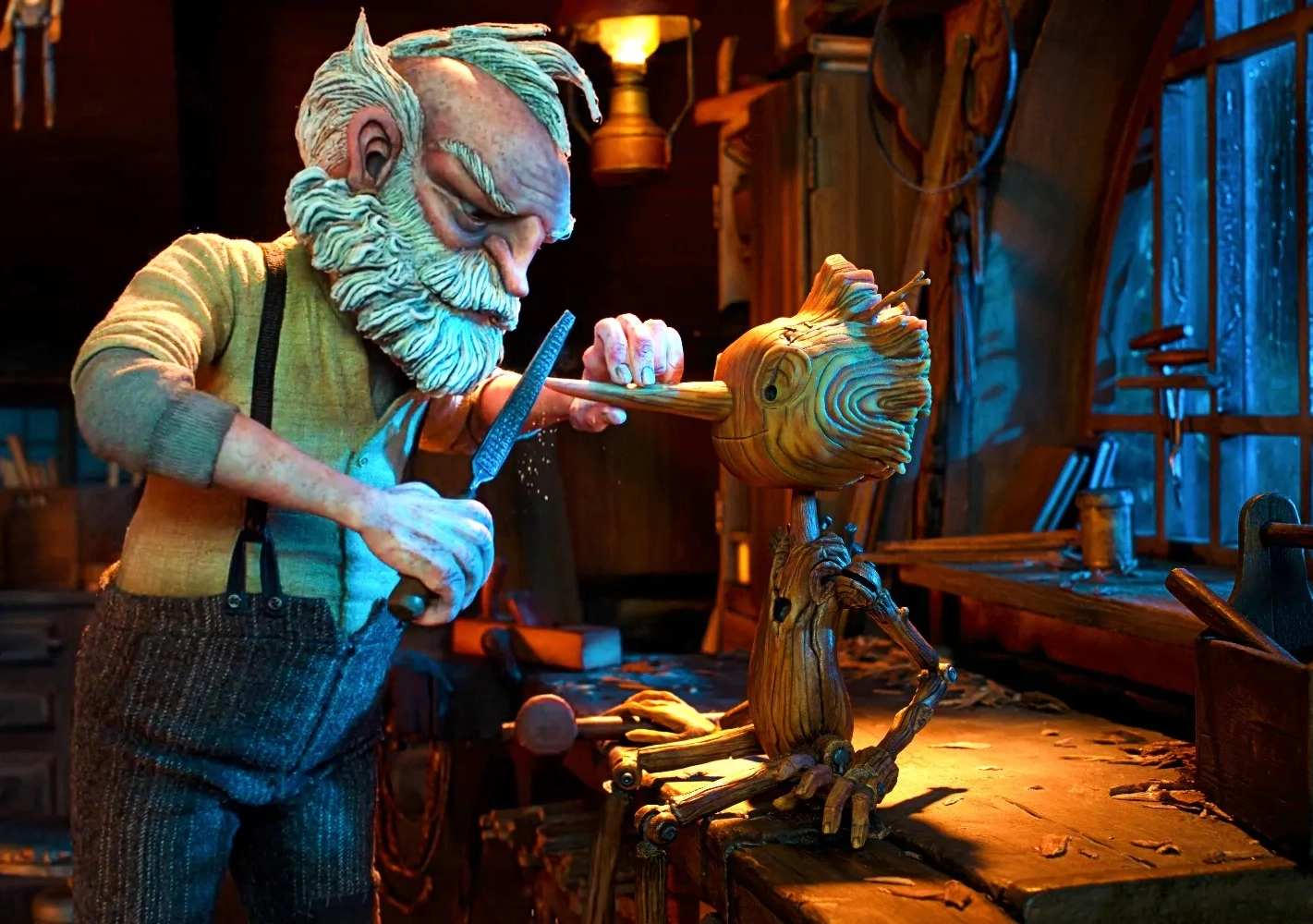
Death tells Pinocchio: “The one thing that makes human life precious and meaningful, you see, is how brief it is.”
When Pinocchio and Geppetto finally come together, Geppetto says, “Pinocchio, my child, I was trying to make you someone you were not. So don’t be Carlo or anyone else. Be exactly who you are. I love you exactly as you are.”
Pinocchio responds, “Then I will be Pinocchio. And you will be my papa. Will that do?”
Wouldn’t it be nice if we understood that God values us like that?
We can tell better stories — stories that affirm the goodness and beauty of who we are, stories that foster healing by telling the truth about relational wholeness with self, neighbor and God.
“We organize the universe through stories,” del Toro said. “Telling the truth about who you are is the essential thing in life. … The idea in Pinocchio is, ‘Can we love each other while we’re briefly in this world? Can we belong to each other? Can we support each other no matter what you are or what you look like?”
Awareness begins by recognizing the truth with a love that heals.
This healing begins for Geppetto when Pinnochio finds him. And there, in the midst of their darkness, del Toro chose a song to echo in the background:
And if you looked at me today, my heart would heal so fast.
And if you held me right away, I’d be complete at last.
Rick Pidcock is a 2004 graduate of Bob Jones University, with a Bachelor of Arts degree in Bible. He’s a freelance writer based in South Carolina and a former Clemons Fellow with BNG. He recently completed a Master of Arts degree in worship from Northern Seminary. He is a stay-at-home father of five children and produces music under the artist name Provoke Wonder. Follow his blog at www.rickpidcock.com.
Related articles:
‘They’re like children’: Confronting the myth of white paternal control | Opinion by Greg Garrett
Interviewer asks Robert Jones how far white Christians will go to control government

